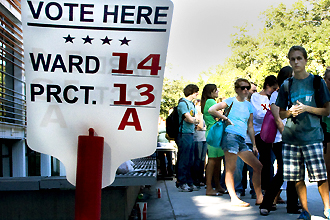Young voters less engaged, so far
Younger “millennial voters” were a key demographic for the 2008 Obama campaign, but according to a new study released by the Pew Research Center, those voters are less engaged and less enthusiastic than they were four years ago.

Younger voters flock to the polls for the last presidential election. Whether or not the enthusiastic political engagement of 2008 will be repeated in 2012 remains to be seen, says political scientist Brian Brox. (Photo by Ryan Rivet)
According to the Pew study, which was released in November, 13 percent of voters ages 18 to 30 say they have given a lot of thought to the 2012 election, down from 31 percent in 2007. Despite this apparent “enthusiasm gap,” the trend will reverse as the election draws nearer, says Brian Brox, assistant professor of political science.
“Part of this will self-correct once the media start focusing on the two-party campaign as we get closer to the summer and fall next year, as well as when Democratic campaigns start spending money,” Brox says.
He points to the fact that most millennial voters tend to be “fairly Democratic,” and right now there is nothing happening on that side of the ballot.
“Considering what the Pew survey found about the overall demographic and policy characteristics of the millennial generation, they're the most non-white, the most liberal on most social policies. They don't need to be engaged at this point in terms of Obama vs. the Republican presidential candidates,” Brox says.
Still, Brox says issues like college debt and disenchantment with the Obama administration thus far may “keep [younger voters] from being as potent a force as they were four years ago.”
Brox says the Obama campaign has a “road map of how to reach younger voters,” something GOP candidates will have to master if they hope to capitalize on any dissatisfaction among millennials.
“One of the interesting dynamics on the Republican side will be to what degree do Republican organizations embrace social media in order to mount an effective counter-attack?”
